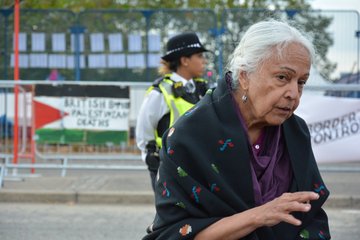
Amrit Wilson
Activist and writer who has focused on issues such as gender and racial equality in Britain
Place of birth
Date of arrival to Britain
About
Amrit Wilson was born in India and migrated to Britain to pursue a PhD. In the 1970s she became a prominent Marxist feminist activist, anti-racist campaigner and journalist.
Wilson’s seminal Finding a Voice: Asian Women in Britain was published by Virago in 1978. The book documented the testimonies of South Asian women who were coping with the difficulties of living in Britain, particularly in terms of family life, community, work and trade unionism, including testimony from Jayaben Desai about her experiences of leading the Grunwick strike. In an interview with Sophia Siddiqui to mark the fortieth anniversary of Finding a Voice, Wilson described how interviewees welcomed her into their homes to share their stories and treated her like a sister. It was an important scholarly intervention, which unearthed and centred lesser-known experiences of newly migrated South Asian women, who were contending with the acute difficulties of poverty, institutional racism and gender inequality. However, Pratibha Parmar was cautious that some people’s reading of the book could strengthen ideas that South Asian men and families were more patriarchal, sexist or violent than white men and white families. Despite this criticism, the book was commercially successful and was the recipient of the Martin Luther King Memorial Prize. In 2018, on its fortieth anniversary, Finding a Voice was reprinted. In addition to her book, Wilson intermittently contributed to the feminist magazine Spare Rib during the 1970s. Her articles addressed wide-ranging issues, including local anti-racist and trade union protests led by South Asian women, sexist immigration laws, policing and pregnancy.
In 1979 Wilson co-founded Awaz, Britain’s first South Asian feminist group. Awaz joined OWAAD (Organization of Women of African and Asian Descent) to picket at Heathrow Airport in response to virginity testing on incoming South Asian women. In addition, Awaz resisted police brutality with the Brixton Black Women’s Group, demonstrating the connections between Black and South Asian feminist activists. Awaz was a small organization with about six members and ended in the 1980s. During this period, Awaz founded the first South Asian women’s refuge in London named Asha.
In the mid-1990s Wilson wrote a play titled Chandrelekha, which was about the challenges racialized minority women in Britain face and their activism. The play, which was produced by Sphinx Theatre Company, toured across the UK, including Batley, Leeds, Birmingham and Wolverhampton.
Wilson has subsequently been involved in other organizations, such as Imkaan – a network of refuges for racialized minority and refugee women – as well as Asian Women Unite. She was appointed Lecturer in Women’s Studies at Luton University.
In 2024 Wilson revealed that her Overseas Citizen of India (OCI) card was rescinded based on accusations that she was involved in ‘multiple anti-India activities’. These included participating in an online discussion about Kashmir and publishing a 2021 article on the Indian farmers' protest for Tribune which was critical of the Modi government.
Finding a Voice: Asian Women in Britain (London: Virago, 1978)
The Challenge Road: Women and the Eritrean Revolution (London: Routledge, 1991)
Dreams, Questions, Struggles: South Asian Women in Britain (London: Pluto Press, 2006)
The Threat of Liberation: Imperialism and Revolution in Zanzibar (London: Pluto Press, 2013)
Barnett, Marcus, ‘Solidarity with Amrit Wilson’, Tribune (24 April 2024), https://tribunemag.co.uk/2024/04/solidarity-with-amrit-wilson
Siddiqui, Sophia ‘"Reclaiming our collective past": Meeting Amrit Wilson’, Institute of Race Relations (8 November 2018), https://irr.org.uk/article/reclaiming-our-collective-past-meeting-amrit-wilson/
Thomlinson, Natalie, Race, Ethnicity and the Women’s Movement in England, 1968–1993 (Basingstoke: Palgrave Macmillan, 2016)
MS 1579/2/16/8/1, Asian Women in Britain: London Education Development Centre, Birmingham Archives, Birmingham
FL/DIASPORA/1, Diaspora Magazine, Bishopsgate Institute, London
RC/RF/23/01/A, Black and ethnic minority women - general 1985 - 1995, Black Cultural Archive, London
C1420/19, Sisterhood and After: The Women’s Liberation Oral History Project, British Library, St Pancras
Image credit
‘Empire in Arms’ workshop with Amrit Wilson, South Asia Solidarity Group, 5 September 2019
Creative Commons CC BY-SA 2.0 Licence, https://creativecommons.org/licenses/by-sa/2.0/ via flickr.com
